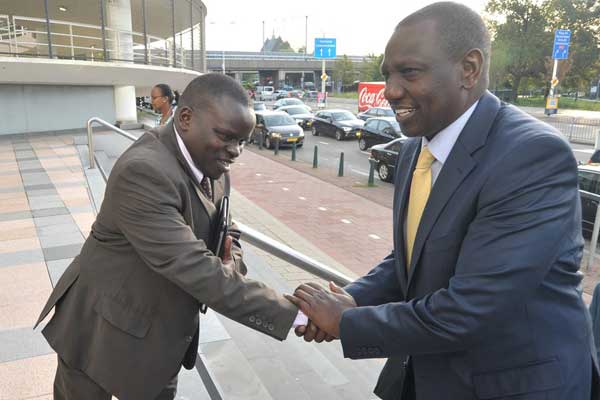
Deputy President William Ruto and former radio presenter Joshua arap Sang have been set free by the International Criminal Court.
Judges decided by a majority that the case against DP Ruto and Mr Sang be terminated, adding that the decision does not preclude future prosecution at the ICC or in a national jurisdiction.
“The charges are hereby vacated and the accused are discharged from the process without prejudice to their presumption of innocence or the prosecutor’s right to re-prosecute the case at a later time,” Presiding Judge Eboe-Osuji said.
Judges Eboe-Osuji and Robert Fremr, as a majority, agreed that the charges should be vacated and the accused be discharged, but they provided different reasons for their decision.
Judge Fremr found that the accused had no case based on an assessment of the prosecution’s evidence in accordance with the chamber’s guidelines.
He argued that the prosecution did not present sufficient evidence on which a reasonable trial chamber could convict the accused.
Accordingly, he concluded that there was no reason to call the defence to bring their case or to prolong the proceedings any further.
Judge Eboe-Osuji concurred with Judge Fremr’s assessment but declared a mistrial in the case, arguing that it could not be discounted that the weakness in the prosecution’s case might be explained by the demonstrated incidence of tainting of the trial process by way of witness interference and political meddling that was reasonably likely to intimidate witnesses.
Judge Hererra Carbuccia appended a dissenting opinion. In her view, the charges against the accused should not be vacated.
Judge Carbuccia said the prosecution’s case had not broken down, concluding there was sufficient evidence on which, if accepted, a reasonable trial chamber could convict the accused.
The ICC trial chamber ruled that the post-election violence victims should be invited to express their views and concerns in relation to reparations or assistance in lieu of reparations.
The ICC has failed to convict all of the six suspects presented by Ms Fatou Bensouda’s predecessor Luis Moreno Ocampo as the people who bore the greatest responsibility for the crimes against humanity perpetrated in 2007/2008 PEV.
The six suspects included President Uhuru Kenyatta (then the Deputy Prime Minister and minister for Finance), Mr Ruto (then Eldoret North MP), Mr Henry Kosgey (then Tinderet MP), Ambassador Francis Muthaura (then head of public service), General Hussein Ali (then Kenya Police Commissioner) and Mr Sang.
The 2007/2008 post-election violence left some 1,113 people dead and more than 500,000 internally displaced.
Mr Ruto and Mr Sang’s legal teams filed the no-case-to-answer application last September, saying that ICC Prosecutor Fatou Bensouda had not built a case to have then put on their defence.
The application was heard in January, but the judges blocked the defence teams from presenting witnesses to support their arguments.
However, lawyer Karim Khan, for Mr Ruto, and Mr Katwa Kigen, for Mr Sang, argued that the case had collapsed after the prosecution failed to present adequate evidence.







